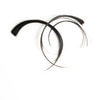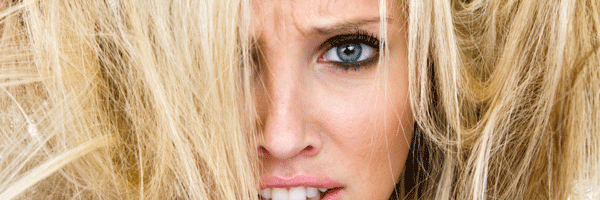|
A city’s streetscape has long since offered a reservoir of trends that trickle into the salon. Here’s how street styles have infiltrated hairstyling’s biggest moments and continue to set the pace for the hottest looks of the season.  London calling: Hairstyling in '70s and '80s London, England At the end of the ‘70s and early ‘80s, London is yet again at the vanguard where a reactionary subculture is taking root. The mood is leftist, anarchic and counter-culture. Anti-fashion becomes the norm in clubs nestled in dilapidated factories: torn T-shirts and tattered, plaid stovepipe pants held together with safety pins. Hair is spiked perilously high with glue, egg whites and other concoctions, shaved into a Mohawk, dyed blue-black, recklessly lightened white hot or peppered with striking neon shades of blue, green or hot pink—hello, food colouring! According to Anthony Mascolo, TIGI‘s international creative director and founder of the brand's creative team, “Lots of major cities have amazing and inspirational street style, but of course I’m from London and it never stops inspiring me. Londoners have a real confidence in their fashion and style. It’s a great place to see trends but also for more radical individuals.” An internationally award-winning hairstylist, Mascolo is an industry icon who has been at the forefront of hairstying for more than 30 years. Since the majority of the products that can achieve these looks didn’t exist yet on the market, necessity is the mother of invention, which in turn fuels these street kids‘ creativity. “Over the years though, product innovation has helped influence the street style, along with fashion. From messy looks to sleek finishes, it all comes down to the product,” says Mascolo.  Collective inspiration: How street trends influence collections For Michael Polsinelli and Shay Dempsey, Sebastian Professional's global artistic directors, creative inspiration for their collections, including their most recent, Eclectic, have often begun by observing the looks on the streets. “There has been a revolution, definitely in the past few years,” says Dempsey, “Millenials are their own muses and we take a huge influence from what they are doing.” Noting the repurposing of different materials on the streets of different cities, Polsinelli and Dempsey incorporated the use of hair accessories such as strips of leather, into each of the hairstyles for the collection. In addition Polsinelli says that travelling to new locations and people keeps them on the lookout for emerging trends, because “life has changed so much since the ‘90s and it continues to change rapidly.” The street conquers: Hair and street trends After the explosion of punk, plenty of other youth quakes send aftershocks over the world with their unique mix of fashion codes, colours and defining hairstyles: rasta and hip hop (locks, dreadlocks, braids and mini ‘fros) gothic (violet-black, dramatic), Kawaii (which means “cute” in Japanese and mainly focuses on doll-like beauty) and now, more than ever, cosplay (dressing-up as superheroes and game characters, in which wigs play, obviously, a major role). June Croken, a hairstylist and owner of Hairdresser on Fire in Toronto, has always been inspired by the street “as it represents a borrow from the past and a contrasting element to create a fresh new breath of air.” For her, current hairstyling trends more than ever incorporate elements taken from the street: “Today’s special is as inclusive as it gets. One may dress up or dress down the tresses without a second guess. No longer are trends absolute. You can be natural and organic or slick and severe.” says Croken. Sign of the times: Kylie Jenner is killing it on Instagram with fresh new locks every day via ombré, rainbow tresses and wigs galore. For Mascolo, the goal in modern hairdressing is to create a savvy blend of styles. “Street style is for the public and avant-garde is more for the hairdresser, so I really try to keep a balance between both.”  Fall preview: Athleisure, texture, fringe and hair colour trends With the huge prevalence of athletic wear, often dubbed “athleisure,” everywhere, more women (and, yes, men too) want hair that encapsulates the fitness lifestyle by being more natural and undone. “Absolutely!” echoes Joey Marchese, Essential Looks Artist for Schwarzkopf Professional and senior stylist at bob + paige salon in Toronto. “The idea is that you’re coming back from the gym or your yoga class, so your hair is not too perfect or too shiny. For fall 2016, it’s all about matte and gritty-looking textures.” According to Marchese, more aggressive, longer pieces of hair and a contrast between long and short will be components of these street-style looks. “There’s a little bit of the mullet coming back. ”The idea here is that hair is super-easy and super-fast to style, and that clients are willing to play more with their natural texture. According to Marchese, “Brightly coloured fringes are also going to be huge this fall, particularly with green and yellow tones for some brightness that contrasts with darker hair. The goal of this fringe is to have a section of your hair that is more “done,” blow-dried and very well cut, while the rest of the hair stays more natural.” And in terms of anti-establishment colour trends, we’re moving away from greyish pastels towards greenish tones. “I’m seeing a lot more of these browns infused with greens on the street where our salon is located,” says Marchese. Ready? Now it’s your turn to play the street angle! (source)
0 Comments
Take a look inside this month's newsletter.
What’s Inside This Month This Bad Habit May Ruin Your Hair 10 Tips to Care for Your Hair in Winter How Street Styles Have Influenced Hairstyling DIY Hair Fails (Don’t Try These at Home) Best Men’s Haircut for Every Face Shape Meet the Inventor of the Blowout Podcast: Knights of the Razor Movies Opening This Month The Best of 2016 Scary Color Requests Coming Soon on DVD / Streaming Track Your Time, Change Your Life Dates for Your Calendar: January Hair Care: Hair Masks for Damaged Hair Recipe: Meatloaf Remixed Most-Googled Recipes and Food Trends of 2016 In the News: Hair and Beauty 2016 San Francisco Small Business Excellence Award - Men’s Hair Salons "People don't want to be haunted by the ghosts of the people from whom the hair has come. There is still a 'yuk' factor to the whole idea of buying and wearing other people's body parts," she says. The whole supply chain is shrouded in secrecy from beginning to end." From wigs to weaves and hair extensions, the market for human hair is enormous. But few know where these lustrous locks come from and the journey they take across the globe.
Read More > – Hair Part Theory –The Hair Part Theory states, The way a person parts [his or her] hair is related to many subconscious associations when assessed by others. Each hair part type initiates cycles of behavior toward, and response from, the individual. Over time, these cycles affect personality development. What Is Your Hair Part Saying About You?The Effects of Hair Parting on Social Appraisal and Personal Development By Catherine Walter and John Walter Surprisingly, a hair part has a crucial impact on interpersonal relationships by affecting immediate character appraisal, perceived personality traits, self-perception and self-development! The Hair Part Theory was developed by a brother-sister team trained, respectively, in nuclear physics and cultural anthropology. Their revolutionary theory is now being made available to the general public, so that all individuals can have more control over automatic and mostly unconscious assessments made of their personalities by others. John and Catherine Walter also produce the True Mirror®, a mirror that does not reverse the viewer’s image and which therefore allows an accurate self-assessment. A left hair part draws unconscious attention to the activities that are controlled by the left hemisphere of the brain, i.e. activities traditionally attributed to masculinity. A right hair part draws unconscious attention to the activities that are controlled by the right hemisphere of the brain, i.e. activities traditionally attributed to femininity. A man who parts his hair on the right, and who is striving for positive assessment in a traditionally male role is at risk for having difficulties in interpersonal relationships, since he is sending a mixed, subconscious message by emphasizing the activities of the brain traditionally attributed to femininity. A woman who parts her hair on the left, and who is striving for positive assessment in a traditionally male role (for example, in business or politics) will be taken more seriously than a woman with a right part, who is emphasizing mental processes that are traditionally attributed to femininity. Use the links below to access the full theory paper, as well as an analysis of United States Presidents, Vice Presidents, state Governors (in office 9/98), and the Senators and Representatives of the 105th Congress according to their hair part choice, with an emphasis on those who part their hair on the right. Additionally, a list of famous men who wear a right part is included, since these men illustrate some of the surprising ways that a right hair part affects personality and perception of personality. The Hair Part Theory (c)1998 PDF version – Complete data included The Hair Part Theory Web Version Lincoln - Left or Right? Hair Part Theory – Discover the Difference! RadioLab: Mirror, Mirror The Atlantic: The Mirror of Dorian Gray I was hanging out with a few friends recently and we were talking about hair (of course we were) and someone mentioned that there wouldn't be any more blondes in a few hundred years. I'd never heard this before so I thought I'd research their comment.
The Claim: A study undertaken by the World Health Organization concluded that natural blondes are likely to be extinct within 200 years. Well, this is completely FALSE. The problem is that blonde hair is caused by a recessive gene. In order for a child to have blonde hair, it must have the gene on both sides of the family in the grandparents' generation. The researchers also believe that so-called bottle blondes may be to blame for the demise of their natural rivals. They suggest that dyed-blondes are more attractive to men who choose them as partners over true blondes. But Jonathan Rees, professor of dermatology at the University of Edinburgh said it was unlikely blondes would die out completely. "Genes don't die out unless there is a disadvantage of having that gene or by chance. They don't disappear," he told BBC News Online. "The only reason blondes would disappear is if having the gene was a disadvantage and I do not think that is the case. "The frequency of blondes may drop but they won't disappear." [source: BBC News] (Source: Science: HowStuffWorks) SNOPES.com also debunked this claim. And what about redheads? Are they going extinct? |
Hair by BrianMy name is Brian and I help people confidently take on the world. CategoriesAll Advice Announcement Awards Balayage Barbering Beach Waves Beauty News Book Now Brazilian Treatment Clients Cool Facts COVID 19 Health COVID 19 Update Curlies EGift Card Films Follically Challenged Gossip Grooming Hair Care Haircolor Haircut Hair Facts Hair History Hair Loss Hair Styling Hair Tips Hair Tools Health Health And Safety Healthy Hair Highlights Holidays Humor Mens Hair Men's Long Hair Newsletter Ombre Policies Procedures Press Release Previous Blog Privacy Policy Product Knowledge Product Reviews Promotions Read Your Labels Recommendations Reviews Scalp Health Science Services Smoothing Treatments Social Media Summer Hair Tips Textured Hair Thinning Hair Travel Tips Trending Wellness Womens Hair Archives
June 2025
|
|
Hey...
Your Mom Called! Book today! |
Sunday: 11am-5pm
Monday: 11am-6pm Tuesday: 10am - 6pm Wednesday: 10am - 6pm Thursday: By Appointment Friday: By Appointment Saturday: By Appointment |





 RSS Feed
RSS Feed